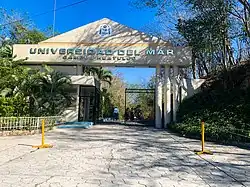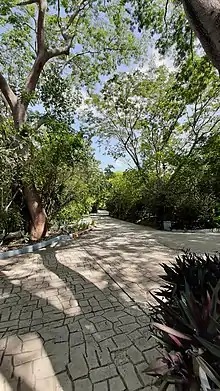| Universidad del Mar | |
|---|---|
 | |
| Location | |
Puerto Ángel, Puerto Escondido and Huatulco Mexico | |
| Information | |
| School type | Public |
| Motto | In Latin "Mare Nostrum Veritabile Faciendum" |
| Established | 1992 |
| Rector | Dr. Modesto Seara Vázquez |
| Website | http://www.umar.mx |
The Universidad del Mar «UMAR» is a public institution of higher education and scientific research of the Government of the State of Oaxaca, Mexico, with the support and recognition of the Federal Government, it belongs to the Oaxaca State University System (OSUS), it has three university campuses: Puerto Angel, Puerto Escondido and Huatulco and a Center of Tourist Training (CECAT). Its main functions are: teaching, research, cultural diffusion and promoting development.[1]
UMAR was founded in 1992 at the request of the governor of Oaxaca, Heladio Ramírez López. It was designed and executed by Dr. Modesto Seara Vázquez, rector of the university.
The Universidad del Mar has positioned itself as one of the best universities in the country and proof of this has been the results achieved in the last thirteen years, where the bachelor's degrees in Tourism Administration and International Relations have obtained the first places in the CENEVAL knowledge test.[2]
Objectives of this university model
To decentralize higher education:[3]
To avoid the concentration of academic and scientific resources in areas that are becoming disproportionately strong and increasingly differentiated from the rest of the country.
To prevent the human decapitalization of the most disadvantaged regions, which due to the lack of educational opportunities, the communities see young generations leave at an early age that facilitates their permanent uprooting, due to the emotional and sentimental ties and interests that are produced in the place of residence, and which makes their recovery practically impossible.
To improve knowledge of the economic resources of the concerned region, in order to lay the foundations for sound economic and social development.
To train social leaders in the public and private spheres.
To introduce a professional elite into a society that lacks one, to serve as a catalyst for transformation.
To improve the cultural competitiveness of the area of influence of the respective university, by combining the reception of ideas and modernizing concepts, with the conservation and reinforcement of the own values.
To contribute, in a globalized world, to the competitiveness of the economy of Oaxaca and Mexico, seeking the highest standards of quality in teaching and research, without any kind of absurd inferiority complex.

Motto
The motto Mare Nostrum Veritabile Faciendum (written in Latin) means "Let us truly make the sea ours".[4]
Governing bodies
- Rector, who is the highest university authority, and is appointed or removed by the Governor of Oaxaca.
 Anatomy Room at UMAR, Puerto Escondido Campus.
Anatomy Room at UMAR, Puerto Escondido Campus. - Academic vice-rector and administrative vice-rector, appointed by the rector.
- Vice-rector for Relations and Resources, also appointed by the rector. They have only been appointed for the Universidad Tecnológica de la Mixteca and Universidad del Mar, which are respectively in charge of the SUNEO offices in Mexico City and Oaxaca.
- Head of department and directors of research institutes, as well as the heads of the postgraduate studies. They are appointed by the rector.[5]
Academics
UMAR offers 16 undergraduate programs in addition to 11 postgraduate studies.[6]
Bachelor's degrees
- Actuarial Studies - Huatulco campus
- Animal Science - Puerto Escondido Campus
- Aquaculture Engineering - Puerto Ángel Campus
- Biology - Puerto Escondido Campus
- Communication Sciences - Huatulco Campus
- Economics - Huatulco Campus
- Environmental Engineering - Puerto Ángel Campus
- Fishing Engineering- Puerto Ángel Campus
- Forestry Engineering - Puerto Escondido Campus
- Informatics – Puerto Escondido Campus
- International Relations - Huatulco Campus
- Marine Biology - Puerto Ángel Campus
- Maritime Sciences - Puerto Ángel Campus
- Nursing - Puerto Escondido Campus
- Oceanology - Puerto Ángel Campus
- Tourism Administration - Huatulco Campus
Postgraduate Studies
Masters
- Animal Production and Health - Puerto Escondido Campus
- Environmental Sciences - Puerto Ángel Campus
- International Criminal Law - Huatulco Campus
- International Relations: Environment - Huatulco Campus
- Science: Genetics of Biodiversity - Puerto Escondido Campus
- Science: Marine Ecology - Puerto Ángel Campus
- Science: Wildlife Management - Puerto Escondido Campus
- Tourism Marketing - Huatulco Campus
Doctorates
- Animal Production - Puerto Escondido Campus
- Environmental Sciences - Puerto Escondido Campus
- Marine Ecology - Puerto Ángel Campus
Infraestructure
UMAR has forty laboratories,[7] for example:
- Aquaculture - Puerto Ángel Campus
- Phycotoxin Analysis (Larvatron) - Puerto Ángel Campus
- Food Analysis and Technology - Puerto Ángel Campus
- Mass Calculation - Puerto Ángel Campus
- Biological Collections - Puerto Escondido Campus
- Coastal Dynamics - Puerto Ángel Campus
- Teaching Biological Oceanography - Puerto Ángel Campus
- Teaching Physical Oceanography - Puerto Ángel Campus
- Teaching Geological Oceanography - Puerto Ángel Campus
- Ecology of the Bentos - Puerto Ángel Campus
- Histology - Puerto Ángel Campus
- Ichthyology and Fisheries Biology - Puerto Ángel Campus
- Environmental Engineering - Puerto Ángel Campus
- Research in Chemistry and Biology - Puerto Ángel Campus
- Genetic Research - Puerto Ángel Campus
- Microbiology - Puerto Escondido Campus
- Chemical Oceanography - Puerto Ángel Campus
- Geographic Information Systems and Remote Sensing - Puerto Ángel Campus
- Systematic of Marine Invertebrates -Campus Puerto Ángel
- Microalgae Technology -Campus Puerto Ángel
Research
UMAR has 9 Research Institutes[8]
- Communication Sciences - Huatulco Campus
 Droplet Digital PCR System, QX200, BIORAT at the Laboratory of Genetics at Universidad del Mar, Puerto Escondido Campus.
Droplet Digital PCR System, QX200, BIORAT at the Laboratory of Genetics at Universidad del Mar, Puerto Escondido Campus. - Social Sciences and Humanities - Puerto Ángel Campus
- Ecology -Campus Puerto Escondido and Puerto Ángel Campus
- Economic Studies - Huatulco Campus
- International Studies Isidro Fabela - Huatulco Campus
- Genetics -Campus Puerto Escondido and Puerto Ángel Campus
- Industries -Campus Puerto Escondido and Puerto Ángel Campus
- Resources -Campus Puerto Escondido and Puerto Ángel Campus
- Tourism - Huatulco Campus
Publications
Books[9]
The Decisive Hour. Seara Vázquez, Modesto. 2018. 330pp.
Corporaciones Multinacionales. Una mirada a Oaxaca. Lozano Vázquez, Alberto, Marco Antonio Guadarrama Vega, Saúl Mendoza Palacios, Carlos Gabriel Argüelles Arredondo (Coord.). 2017. 330 pp.
La Vuelta al Mundo en 80 años. Seara Vázquez, Modesto. 2016. 433pp.
Los puertos de España y México. González Laxe, Fernando and Ojeda Cárdenas, Juan N. (Coord.). 2013. 318pp.
Después de la Tragedia. A 70 años de la Segunda Guerra Mundial. Seara Vázquez, Modesto and Lozano Vázquez, Alberto (Coord.). 2015. 806pp.
DDT Mitos y Realidades. Hernández Carlo, Beatriz and Martha E. Alcántara Garduño. 2012. 230pp.
Aves del Jardín Botánico. Bojorges B. José C. 2012. 92pp.
La Sociedad Internacional Amorfa. Soluciones inadecuadas para problemas complejos. Seara Vázquez, Modesto (coord.). 2011. 654pp.
La iguana negra. Fundamentos de reproducción, nutrición y su manejo en cautiverio. Arcos García, José Luis and Roberto López Pozos. 2009. 164pp.
Diagnóstico de los Recursos Naturales de la Bahía y Micro-cuenca de Cacaluta. Domínguez Licona, Juan Manuel (Ed.). 2008. 453pp.
Rusia hacia la Cuenca del Pacífico. 2007. Roldán, Eduardo (Ed.). 355pp.
La política exterior de México durante la Segunda Guerra Mundial. Velázquez Flores, Rafael. 2007. 205pp.
Atlas de corales pétreos (Anthozoa: Scleractinia) del Pacífico mexicano. Reyes Bonilla, Héctor, et al. 2005. 124pp.
Factores, bases y fundamentos de la política exterior de México. Velázquez Flores, Rafael. 2005. 332pp.
Estudio de Ordenamiento Ecológico para la Zona Costera del Istmo de Tehuantepec. Serrano Guzmán, Saúl J. (coord.). 2004. 159pp.
Mujeres Empresarias y Turismo en la Costa Oaxaqueña. Informe Diagnóstico y Directorio. Fernández Aldecua, María José and Pascal Barradas Salas. 2001. 81pp.
Biología y aprovechamiento del camarón Duende Streptocephalus (Crustacea-branchiopoda). Castrejón Ocampo, Laura. 1993. 72pp.
Diagramas prácticos para la acuicultura. Porras Díaz, Demetrio and Laura Castrejón Ocampo. Cuadernos 1. 1993. 111pp.
Mezcal. Moctezuma, Isidro. 2018. 113pp.
Journal[10]
Ciencia y Mar. Published quarterly since 1997
External links
Official page of the university: http://www.umar.mx/nuestrauniversidad_eng.html
References
- ↑ Universidad del Mar. "What is UMAR?". Retrieved June 11, 2020.
- ↑ CENEVAL. "Estadísticas de los EGEL". Retrieved June 11, 2020.
- ↑ Seara Vázquez, Modesto (2010). A New Model of University. Huajuapan de León, Mexico: Universidad Tecnológica de la Mixteca. p. 148. ISBN 978-607-95222-1-6.
- ↑ Universidad del Mar. "History". Retrieved June 11, 2020.
- ↑ "Extra Periódico Oficial. Gobierno del Estado de Oaxaca" (PDF). Reglamento Interno de la Universidad del Mar: 10.
- ↑ Universidad del Mar. "Graduate Division". Retrieved June 11, 2020.
- ↑ Sistema de Universidades Estatales de Oaxaca (2019). Hechos 2019. Tres Décadas de servir a México 1988-2018. Huatulco, Mexico. p. 48.
{{cite book}}: CS1 maint: location missing publisher (link) - ↑ Sistema de Universidades Estatales de Oaxaca (2019). Hechos 2019. Tres Décadas de servir a México 1988-2018. Huatulco, Mexico. p. 79.
{{cite book}}: CS1 maint: location missing publisher (link) - ↑ Universidad del Mar. "Publications". Retrieved June 11, 2020.
- ↑ Universidad del Mar. "Publications". Retrieved June 11, 2020.